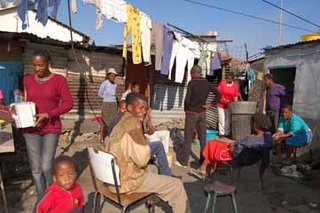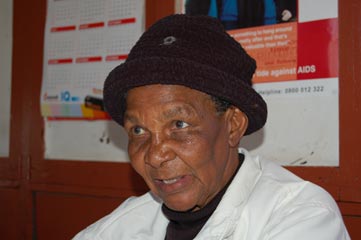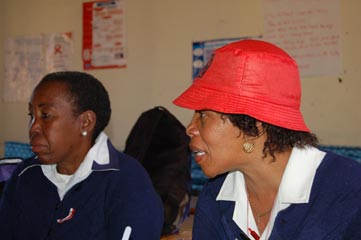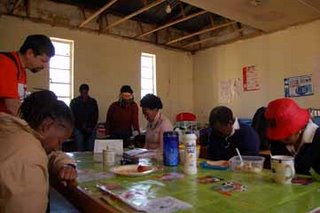
Soweto has to be one of the most intensely human places on earth. An acronym for "South Western Township" -- since it is the urban area on the southwestern side of Johannesburg -- Soweto is home to nearly 5 million people, and it is only 30 miles by about 25 miles in size.
There are many different individual townships within Soweto, and World Vision is working most intensively in "Orlando East."
There are so many people packed into Orlando East that it seems a world unto itself. We visited in one home that was occupied by an unbelievable 45 people! Mothers, fathers, brothers, sisters, aunts, uncles, cousins, grandparents and grandchildren, great-grandparents and great-grandchildren, all live together on a piece of property far smaller than the one occupied near Seattle by my wife and daughter and me.
There are rows and rows of similarly constructed home sites, and each of these sites also contains on average several "shacks" (small, corrugated tin outbuildings, maybe 10 or 15 feet on a side, which are themselves homes that are rented to others, usually family members), often so close they are almost touching.
Before apartheid ended, people had to live in Soweto ... they couldn't leave. Now they don't have to, per se ... but many people are still trapped in the ghetto, by economic circumstance. Others, like our guide Guguletha, World Vision's "Netcare Program Manager" for the Orlando East Area Development Program (ADP), simply consider it home. I'm not sure about how they feel about the crowds, but they love the people.
And much love is required. Every other person in Orlando East is unemployed ... and one out of three is HIV-positive. We saw more funeral businesses than any other kind of establishment. Business is booming for the undertakers in a place so devastated by the scourge of AIDS.
It takes a special kind of person to dish out simple human caring and compassion in a place of such overwhelming needs. We met a whole roomful of such special people when we visited the Tlhokomelo Home-Based Care Project.

Under the direction of "Mama" Jakobel Matilda Mavimbela, a nurse who began her professional career in the 1940s, the project employs 14 "home-based caregivers," 10 of whom have completed special government certification that makes them the equivalent of a nursing assistant or better. These compassionate angels walk miles and miles every day, five days a week, to visit a minimum of 5 (usually closer to 10) people, most of whom are AIDS sufferers, but also the elderly and infirm with other conditions. They provide food, help people with their medicines, wash their wounds, pray with them, care for them and in general try to get them well enough to attend weekly group meetings at the center.

Maria (wearing the red hat) was one of the caregivers who held me spellbound by her testimony and commitment to this very difficult cause. When I asked her, "Why do you do this? What makes you get up in the morning to come to a job like this?" her answer was shockingly straightforward:
"I am HIV-positive," she said softly. "This is my fourth year. Doing this job wasn't what I wanted to do after finishing school, in 2003. Then I started working at other companies. But I started falling in love with the job when I started working here.
"I never wanted to be a nurse, I wanted to work in an office. Then I started to come here one day, and I saw what the ladies were doing, and I started to fall in love with the job."
"What do you love about it?" I asked.
"Meeting different kinds of people," she told me. "Telling people about my status. Because I know, particularly when I say, I am HIV-positive, they look at me in amazement ... 'Oh! You?' It really opens doors. They want to know how many years, and it proves that I am able to work, and it helps take the stigma away. I can help these people. Even if I cannot give them anything, I can give some of myself."
Maria acknowledged that her job is a lot of work. Even just the walking, the miles they put on each day, is a lot of work. "But we really love doing it," she assured me. "The feeling we get when we see a patient coming to the support group for the first time, when they get feeling better and are up and around ..."
I told her I thought that one of the hardest parts of her job, for me, would be losing people that she became close to, and she agreed. "Sometimes we blame ourselves," she admitted. "We think, maybe I didn't do enough."
I asked them what they needed to keep on doing what they are doing, and the list was long: Prayer; encouragement; training; bicycles; more gloves and bandages, practical things like that. My prayer is that we can help provide for them some of the things they need to make their lives and jobs easier.

At the close of our time together, it was a privilege for me to pray with and for this group of compassionate caregivers, who were, in more ways than anyone I have yet to meet, the hands and feet of Jesus.
The day wasn't over, but my blogging energy for the moment is exhausted! Next we had the privilege of accompanying one of the caregivers on his rounds. More on that tomorrow!
Photo captions:
Top left: 45 people live in this household in the Orlando East Township in Soweto.
Right: Mama Mavimbela is director of the Tlhokomelo Home-Based Care Project. Fourteen caregivers report to her, and they care for more than 100 people each week, many of them AIDS sufferers, in addition to their families and orphans.
Left: Maria (at right in the photo) has been HIV-positive for four years, which creates a common bond with the people she is ministering to on a daily basis. Her love for her job is strong.
Right: I appreciated the opportunity to pray with and for these wonderful women before we left, with a caregiver named Mandla, to visit an AIDS sufferer named Sinnah as a part of his daily rounds. (More on this tomorrow!)

No comments:
Post a Comment